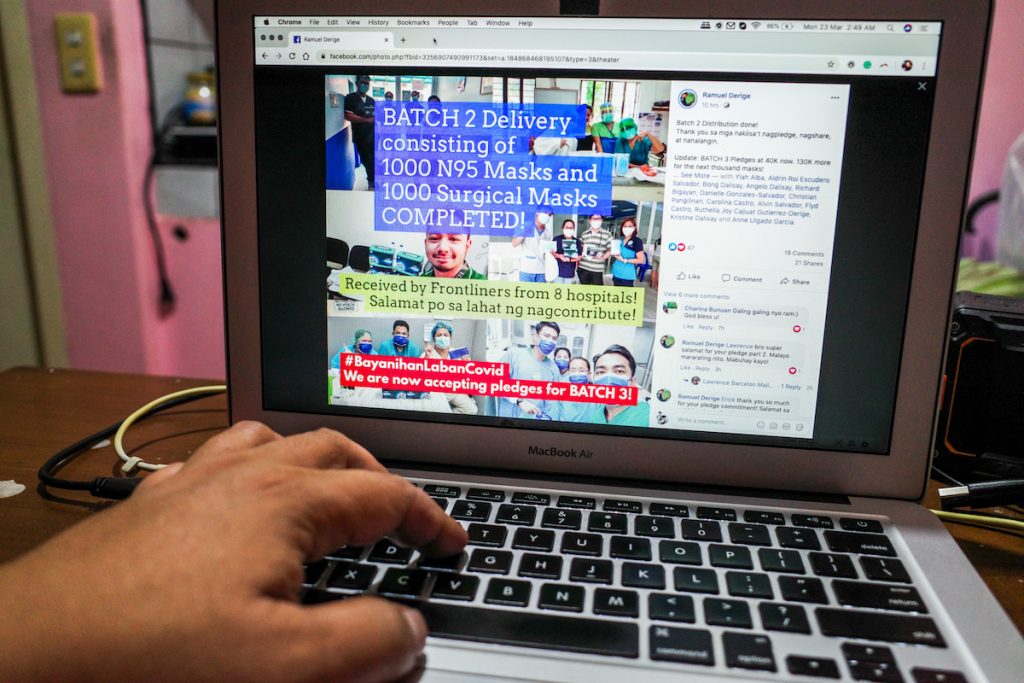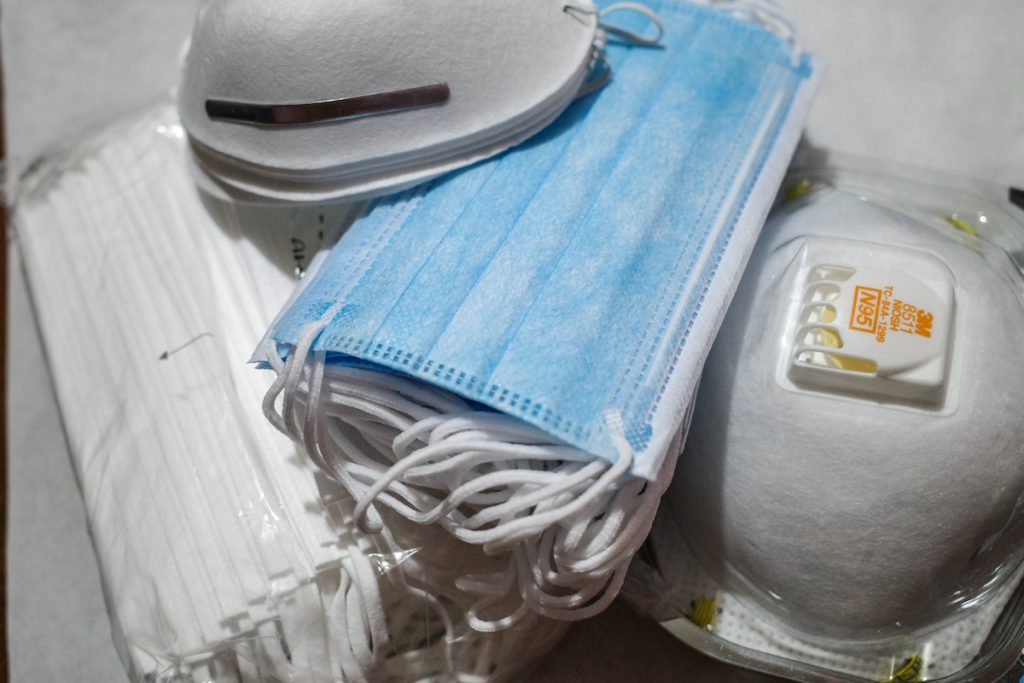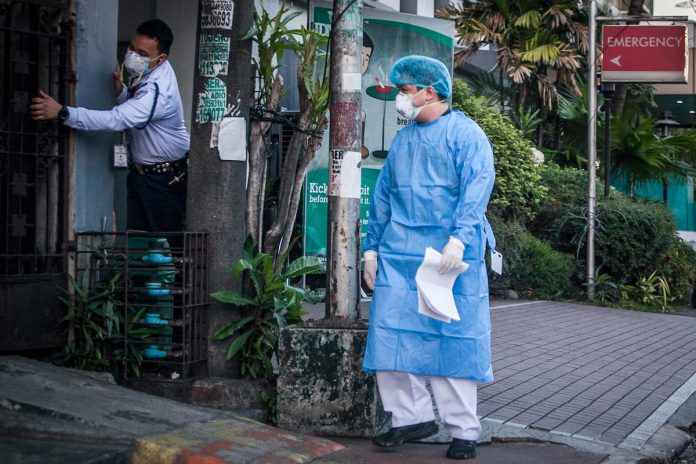The internet has become a medium for Filipinos to extend help to those on the front line in the battle against the spread of the new coronavirus.
Ramuel Derige, a 34-year-old overseas Filipino worker in Dubai, posted on Facebook last week an appeal to friends to provide personal protective equipment (PPE) to hospitals.
In over 12 hours, he was able to raise about US$3,500 from people not just in the Philippines but from other countries like the United Arab Emirates, Australia, South Korea, and the United States.
Derige and his friends were able to buy 1,000 N95 masks and had them distributed to six hospitals in the Philippine capital and the nearby province of Cavite.
Derige and his friends, all members of the United Methodist Church, started the idea in a Viber chat “to keep in touch and discuss current issues.”
“Seeing all the projections, hearing the news, the responses, and the back and forth in social media gave us a feeling of frustration, anger and a general sense of dread,” he told LiCAS.news.
They were concerned about reports that doctors, nurses, security personnel, and cleaning staff are being exposed to the virus and are at very high risk due to the dwindling supplies of PPEs.
The scene that hit them the most was a photograph of health workers converting raincoats into hospital gowns and empty mineral water bottles into masks “to minimize the risk.”
“We admire their bravery and sense of duty and at the same time, we felt helpless. They deserve more support. We recognize that if they fall, we all fall. The whole country falls,” said Derige.
Even before the coronavirus outbreak reached the Philippines, the supply of face masks and other PPEs in the capital was scarce due to the eruption of Taal Volcano in January.
Also, in January, US$1.4-million worth of Philippine-made face masks were sent to Wuhan, China, to augment the need of hospitals that also ran out of PPEs for their health workers.
Last week, health professionals in Metro Manila appealed for donations of face masks. Reports said doctors and nurses have been buying their own face masks.
“That sense of despair really placed us into a doom and gloom scenario, but our discussion was channeled into encouraging each other to do something meaningful,” said Derige.
They decided “to turn our despair into action.”

Pure online, no physical contact
Raising funds is not the hardest part for Derige and his friends. The real challenge was how to purchase the masks, contact the hospitals, and deliver the PPEs.
On March 16, the Philippine government placed the main island of Luzon, including Manila under “enhanced community quarantine,” suspending public transport and closing many business establishments.
“Everyone in the chat group is staying at home because of the lockdown, so we have to do everything online,” said Sylwyn Sheen Alba, who was tasked to contact the hospitals.
The group was also aware of the risk if they will send someone outside to look for suppliers and bring the face masks to the hospitals, which are considered “hot zones.”
“We designated somebody to look for suppliers online. Our first try was a success; however, we know that it was a bit overpriced,” said Alba.
They asked the supplier to deliver the items, through a courier service, to the house of one of their friends, who is in charge of the inventory.
From there, the masks were repacked and labeled with the name of the hospitals and the persons in charge of receiving it.
Using the same courier service, the group sent the items to the health professionals.
“We give the items to the delivery man, pay the services, and wait for the confirmations that they have received the masks,” said Alba.
As proof of receipt, the health workers or hospital recipients take a photo and send it to Alba. “That way, we know that the masks reached them,” she said.
On March 22, the group had a “second wave” of their small online project. They were able to send another 1,000 pieces of N95 masks and 1,000 pieces of surgical masks to eight hospitals.
In just six days, they raised US$7,220 and delivered 3,000 face masks to 14 hospitals while at home and under strict quarantine.
Alba admitted that they met a lot of challenges especially when in purchasing the masks. “It is not easy to find, and suppliers take advantage by selling it at a higher price,” she said.
In normal times, an N95 mask costs an average of US$2 per piece and a regular surgical mask US$0.40 per piece. Prices have since doubled or even tripled.
Since March 20, the national police have already arrested 33 individuals for allegedly hoarding face masks and other medical supplies and reselling them at higher prices.
Police Major General Jose Napoleon Coronel said they conducted at least 13 operations and seized some US$254,000 worth of medical supplies.
Small deeds with a huge impact
A nurse at the University of Santo Tomas Hospital, who requested anonymity, said the masks that they received from Derige’s group “gave us more time to save lives.”
The nurse said face masks should be replaced every four hours if one is dealing with patients inside a health facility, “especially patients with COVID-19 infections.”
But because of the scarcity of face masks, hospital workers are forced to use one face mask for the entire 12-hour shift.
“It is scary because it makes us more susceptible to infection,” said the nurse.
“We hope that more people will help us fight this disease by sending us personal protective equipment so that we can continue doing our jobs protected,” she added.
On March 20, UST Hospital announced that it would “regulate admissions” to the facility due to reduced workforce.
In a statement, the hospital management said 530 health workers, including doctors, nurses, and aides have been quarantined due to exposure to patients with COVID-19.
The hospital also cited the implementation of the enhanced community quarantine and the shortage of the supply of PPEs as reasons of the depleted workforce.
Philippine authorities announced on March 19 that the government will receive about five million face masks from a supplier in Bataan province in April.
In a press briefing, a trade and industry official said they will prioritize supplying health workers and other frontliners.

‘We are all on this together’
As of March 22, the Philippines has 380 confirmed cases of COVID-19 with 25 deaths and 15 recoveries.
Derige said he is optimistic that “we can get through this.”
“If we continue to do positive things, no matter how small, we can push forward and fight the pandemic,” he said.
“Our despair can fuel us into something productive and fruitful. That hope is a self-fulfilling prophecy. There are different ways to cope with this, and what we are doing is just one way,” he added.
Alba said faith drives them to do what they did while in the comforts of their homes or under strict quarantine.
“As Christians, we ought not to turn our eyes blind and our ears deaf to the people who are in need the most,” she said.
“As Christians, we must act while praying. Our compassion drives us every day to feel the plight of our frontliners who are risking their lives in this health crisis,” Alba added.
The group is already planning the purchase and delivery of another batch of face masks to other health facilities in the front lines of the health crisis.









